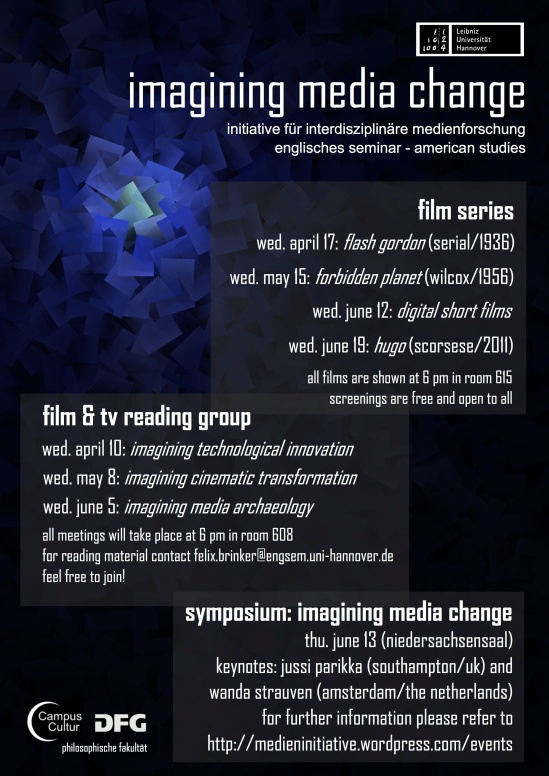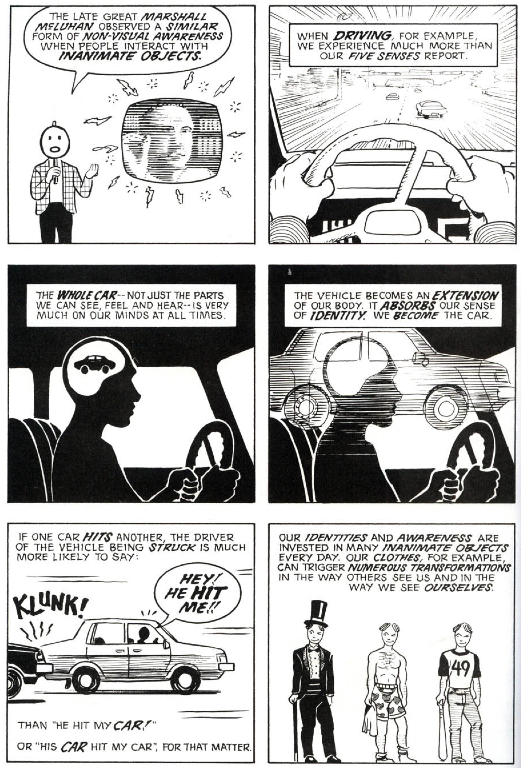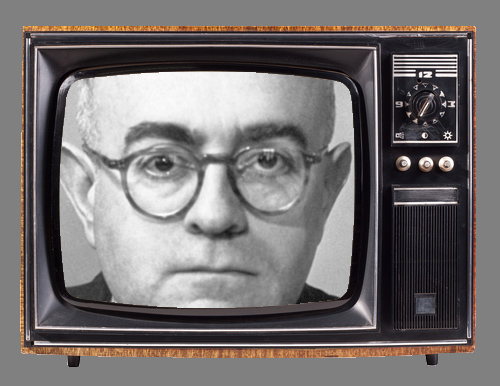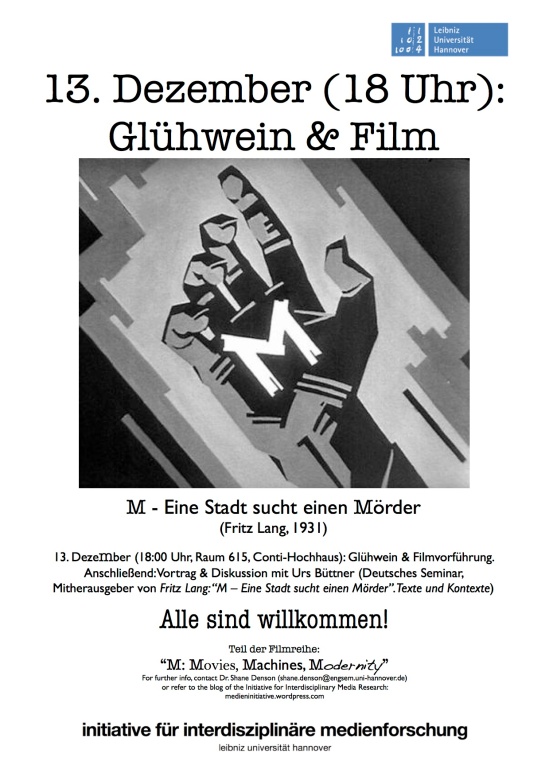April 13, 2011: Inaugural meeting of the Initiative for Interdisciplinary Media Research
May 18, 2011: Shane Denson, “Mediatization & Serialization” (public lecture)
June 8, 2011: Media Initiative blog (medieninitiative.wordpress.com) goes online
July 13, 2011: Preliminary meeting of the Film & TV Reading Group
October 26, 2011: First regular meeting of the Film & TV Reading Group (text: Jason Mittell, “Narrative Complexity in Contemporary American Television” – moderators: Florian Groß, Shane Denson)
October 27, 2011: “Bollywood Nation” film series begins (organized by Jatin Wagle and Shane Denson, in conjunction with Jatin Wagle’s seminar “Long-Distance Hindu Nationalism and the Changing Figure of the Expatriate Indian in Contemporary Bollywood Cinema”); screening #1: Swades: We, the People (2004)
November 24, 2011: “Bollywood Nation” film series, screening #2: Dilwale Dulhania Le Jayenge (1995)
November 30, 2011: Film & TV Reading Group (text: Lynn Spigel, “Television, the Housewife, and the Museum of Modern Art” – moderator: Bettina Soller)
December 8, 2011: “Bollywood Nation” film series, screening #3: Pardes (1997)
December 15-17, 2011: “Cultural Distinctions Remediated: Beyond the High, the Low, and the Middle.” International Conference, organized by Ruth Mayer, Vanessa Künnemann, Florian Groß, and Shane Denson. Sponsored by the DFG, DGfA, American Embassy in Berlin, CampusCultur, and in association with the DFG Research Unit “Popular Seriality—Aesthetics and Practice” and the Initiative for Interdisciplinary Media Research at the Leibniz University of Hannover. Keynote speakers: Jason Mittell and Lynn Spigel. Presentations by Media Initiative members Shane Denson, Florian Groß, Christina Meyer, and Bettina Soller.
December 21, 2011: Film & TV Reading Group (text: Steven Shaviro, “Contagious Allegories: George Romero” – moderator: Stefan Hautke) + film screening: Night of the Living Dead (1968)
January 5, 2012: “Bollywood Nation” film series, screening #4: Mr. and Mrs. Iyer (2002)
January 18, 2012: Film & TV Reading Group (text: Livia Monnet, “A-Life and the Uncanny in Final Fantasy: The Spirits Within” – moderator: Thomas Habedank)
January 26, 2012: “Bollywood Nation” film series, screening #5: Chak De! India (2007)
April 25, 2012: Film & TV Reading Group (text: Mark B. N. Hansen, “Media Theory” – moderator: Shane Denson)
April 26, 2012: “Chaos Cinema?” film series begins (organized by Felix Brinker, Shane Denson, and Florian Groß); screening #1: “Chaos Cinema” (video essays by Matthias Stork)
May 16, 2012: Film & TV Reading Group (text: Steven Shaviro, “Post-Continuity” – moderator: Felix Brinker)
May 24, 2012: “Chaos Cinema?” film series, screening #2: Gladiator (2000); curator: Florian Groß
June 20, 2012: Film & TV Reading Group (text: Rudmer Canjels, “Seriality Unbound” – moderator: Ilka Brasch)
June 21, 2012: “Chaos Cinema?” film series, screening #3: Transformers (2007); curator: Shane Denson (presentation: “Discorrelated Images: Chaos Cinema, Post-Cinematic Affect, and Speculative Realism”)
July 2, 2012: Public lecture – Mark B. N. Hansen, “Feed Forward, or the ‘Future’ of 21st Century Media”; First in a week-long series of events with Mark B. N. Hansen (Duke University), co-organized by Shane Denson and Felix Brinker. Grant secured through the Fulbright Senior Specialist Program. Sponsored by the Guest Professor Program of the Faculty of Humanities, American Studies / English Department, and the Initiative for Interdisciplinary Media Research at the Leibniz University of Hannover.
July 3, 2012: Mark B. N. Hansen, “The End of Pharmacology? Historicizing 21st Century Media”; Guest lecture in Shane Denson’s seminar, “Cultural and Media Theory: Media in Transition”
July 5, 2012: “Chaos Cinema?” film series, screening #4: Scott Pilgrim vs. the World (2010); curator: Felix Brinker (presentation: “Scott Pilgrim Vs. The Movies: Intermedial Collage and Narrative Logic in Scott Pilgrim Vs. The World”)
July 6, 2012: Workshop with Mark B. N. Hansen, including presentations by Media Initiative members Ilka Brasch (“Mapping the Ends of Human Sense Perception”), Felix Brinker (“Between Life and Technics”), and Shane Denson (“Mediate. Discorrelate. Recalibrate.”)
July 11, 2012: Film & TV Reading Group (text: Jack G. Shaheen, “Reel Bad Arabs: How Hollywood Vilifies a People” – moderator: Malte Mühle)
July 17, 2012: Presentations by participants in Shane Denson’s “Digital Media and Humanities Research” course: Linda Kötteritzsch, Julia Schmedes, and Mandy Schwarze, “Bonfire of the Televised Profanities” (blog presentation and discussion of the intersection of TV studies and digital media; Urthe Rehmstedt and Maren Sonnenberg, “Digital Humanities” (video essays).
July 19, 2012: “Chaos Cinema?” film series, screening #5: WALL-E (2008); curator: Shane Denson (presentation: “WALL-E vs. Chaos (Cinema)”)
November 8, 2012: “M: Movies, Machines, Modernity” film series begins (organized by Ilka Brasch, Felix Brinker, and Shane Denson); screening #1: Metropolis (1927); curator: Shane Denson (presentation: “M: Movies, Machines, Modernity – An Introduction”)
November 14, 2012: Film & TV Reading Group (text: Walter Benjamin, “Das Kunstwerk im Zeitalter seiner technischen Reproduzierbarkeit” – moderator: Shane Denson)
November 29, 2012: “M: Movies, Machines, Modernity” film series, screening #2: Man with a Movie Camera (1929); curator: Felix Brinker (presentation: “Movies, Machines, Modernity: On Vertov’s Man with a Movie Camera”)
December 5, 2012: Film & TV Reading Group (text: Jean Baudrillard, “The Ecstasy of Communication” – moderator: Julia Schmedes)
December 13, 2012: “M: Movies, Machines, Modernity” film series, screening #3: M – Eine Stadt sucht einen Mörder; curator/presenter: Urs Büttner
December 15, 2012: Shane Denson, “Batman and the ‘Parergodic’ Work of Seriality in Interactive Digital Environments”; presentation in conjunction with the American Studies Research Colloquium
January 16, 2013: Film & TV Reading Group (text: Theodor W. Adorno, “Prolog zum Fernsehen” – moderator: Felix Brinker)
January 17, 2013: “M: Movies, Machines, Modernity” film series, screening #4: Modern Times (1936); curator: Ilka Brasch (presentation: “M: Movies, Machines, Media – Modern Times)
January 22, 2013: Campus-Cultur-Prize 2013 awarded to the Initiative for Interdisciplinary Media Research and the Film & TV Reading Group by CampusCultur e.V. and the Faculty of Humanities of the Leibniz University of Hannover
January 25, 2013: Shane Denson, “On the Phenomenology of Reading Comics”; guest lecture in Felix Brinker’s “Introduction to Visual Culture” seminar










